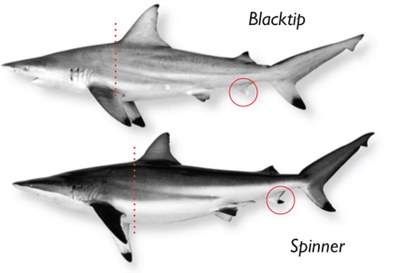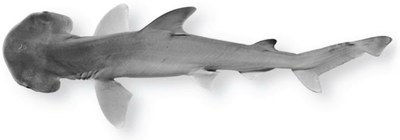Shark Limits & Identification
Bag Limit
The daily bag limit is 1 fish for all allowable shark species including Atlantic sharpnose, blacktip and bonnethead.
Gear Requirement
Non-offset, non-stainless steel circle hooks must be used when fishing for sharks in state waters.
Atlantic Sharpnose, Blacktip and Bonnethead Sharks
Atlantic Sharpnose
Minimum size limit: 24 inches, total length
Body usually has several prominent white spots; second dorsal fin originates over midpoint of anal fin.

Blacktip
Minimum size limit: 24 inches, total length
Similar to spinner but first dorsal fin originates over the pectoral fins and anal fin lacks black tip.

Bonnethead
Minimum size limit: 24 inches, total length
Rounded, shovel shaped head with no indentation at midline of snout; maximum size about 5 feet.

Hammerhead Sharks (Smooth, Great, Scalloped)
Minimum size limit: 99 inches
Other Allowable Shark Species
Minimum size limit: 64 inches
Partial list of allowable species includes:
- Bull
- Stocky body; no interdorsal ridge; large triangular sloping dorsal fin; bluntly rounded snout.
- Finetooth
- Fins unmarked; slender smooth teeth; color bluish-grey above and white below.
- Spinner
- Similar to blacktip but first dorsal fin originates begin behind the pectoral fins and anal fin has black tip.
- Lemon
- First and second triangular dorsal fins about equal in size.
- Blacknose
- Grey to black blotch on tip of snout.
- Thresher
- Upper lobe of caudal fin extremely long and about half of total body length; similar to bigeye thresher but has no grooves on top of head and white abdominal coloring extends above pectoral fins.
- Tiger
- Distinctive vertical blotches or stripes.
- Blue
- Slender body of metallic blue color.
- Nurse
- Brown color; first dorsal fin over pelvic fins; very small eyes; barbels on each side of mouth; no distinct lower lobe on caudal fin.
More Information
Visit NMFS for additional shark identification and general information.
Visit the Gulf of Mexico Fishery Management Council for fishing regulations in Gulf of Mexico federal waters.
*Photos courtesy of Guide to Sharks, Tunas & Billfishes of the U.S. Atlantic & Gulf of Mexico published by NOAA & Rhode Island Sea Grant.